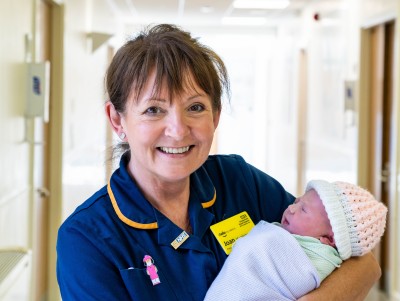
Our Birthing and Maternity Units provide a wide range of antenatal and intrapartum care choices. Various maternity care options include consultant care, shared care, and midwife-only care, including home birth.
Deciding where you would like to have your baby will depend on the facilities and support you would like for your labour and birth, and the kind of pain relief you would like available.
Women and birthing people can choose to give birth at home, however for people with certain medical conditions or complications that may affect pregnancy, your midwife or doctor may advise you that the Labour Ward is the safest place to give birth so that specialists are available if you need extra help during labour.
To learn more about deciding where you might like to have your baby, visit the NHS website.
Our Birthing Centre is a purpose-built facility at Chesterfield Royal Hospital.
The Birthing Centre provides eight Consultant-led care rooms, including one with a birthing pool, and a further four midwifery-led care rooms, including three with birthing pools. It also offers you a relaxed and friendly environment for the birth of your baby.
The benefits of choosing to have your baby at our birth centre are:
- you’re more likely to have a normal birth
- you’re more likely to have access to a birthing pool for labour or birth
- you’re less likely to need intervention
- you’re less likely to have vaginal or perineal tears
- you’re more likely to be satisfied with your care
- you’re less likely to need pain-relieving drugs for labour
When choosing to give birth at home, your care will be provided by a midwife who will support you through labour and the birth of your baby. Having your baby at home is a safe option.
The advantages of giving birth at home include:
-
being in familiar surroundings, where you may feel more relaxed and better able to cope
-
not having to interrupt your labour to go into hospital
-
not needing to leave your other children, if you have any
-
not having to be separated from your partner after the birth
-
increased likelihood of being looked after by a midwife you have got to know during your pregnancy
-
lower likelihood of having an intervention, such as forceps, ventouse, caesarean, episiotomy, 3rd/4th-degree tear or an infection, than giving birth in hospital
Considerations
If you decide that a home birth is the right option for you, let your midwife know. If they have concerns about potential complications, for example, if your baby is lying feet first (breech), they may ask a doctor to discuss the impact of these complications on your birth, so you are fully informed about the decisions you are making. You may be advised against a home birth because of those complications, but ultimately it is your decision where you want to birth your baby.
There are some things you should think about if you're considering a home birth. You may need to transfer to hospital if there are complications. Epidurals are not available at home, but you can use gas and air, a warm bath, a birthing pool, TENS machine and any relaxation techniques you've learned.
Planning a home birth
Here are some questions you might want to ask
-
would a midwife be with me all the time?
-
how do I obtain a birthing pool?
-
what options for pain relief are available at home?
-
how would any complications be dealt with?
-
why would I be advised to transfer to hospital?
-
which hospital would I be transferred to?
-
how long would it take if I needed to be transferred to hospital?
Please contact your midwife to discuss your birthing options.
For most women and birthing people, the community midwife is responsible for antenatal bookings, reducing the need for attendance at hospital.
A patient-held maternity record is in use throughout the service and a full range of antenatal tests, including anomaly screening, is available and ultrasound scanning is carried out on all patients who request screening at 12 and 20 weeks gestation.
Ultrasound scans are accessible to all GPs and community midwives by direct referral and include a limited service at weekends.